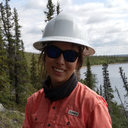
Kira HollandUniversity of Alberta | UAlberta · Department of Earth and Atmospheric Sciences
Kira Holland
MSc Geography
About
6
Publications
1,229
Reads
How we measure 'reads'
A 'read' is counted each time someone views a publication summary (such as the title, abstract, and list of authors), clicks on a figure, or views or downloads the full-text. Learn more
27
Citations
Introduction
Additional affiliations
February 2020 - present
Education
September 2017 - January 2020
January 2014 - May 2017
January 2014 - May 2017
Publications
Publications (6)
Climate change is driving the loss of alpine glaciers globally, yet investigations about the water quality of rivers stemming from them are few. Here we provide an overview assessment of a biogeochemical data set containing 200+ parameters that we collected between 2019 and 2021 from the headwaters of three such rivers (Sunwapta‐Athabasca, North Sa...
Ice wedges are a characteristic ground ice feature in permafrost regions that form primarily from the meltwater of the seasonal snowpack. Ice‐wedge oxygen and hydrogen stable isotopes have been used in winter paleotemperature reconstructions; however, until recently, the ion geochemistry of ice wedges has rarely been analyzed as a potential paleocl...
Plain Language Summary
The history of climate change during the last 11,700 years, a period known as the Holocene Epoch, has been traditionally studied using natural climate proxies such as tree rings or pollen in the sedimentary record. Such records allow us to better understand past climate variability in response to changing greenhouse gas conce...
A majority of Arctic paleoclimate reconstructions demonstrate a long-term cooling trend from the mid to late-Holocene following early Holocene warmth, a trend that is largely explained by decreasing summer insolation in northern high latitude regions. However, this cooling trend is predominantly associated with summer-sensitive climate proxies, ref...
Water isotope records from ice wedges provide a unique opportunity to reconstruct winter paleotemperatures in Arctic regions, a seasonality that is not commonly captured by other proxy types. In high latitude regions, stable isotope ratios (δ18O and δD) of local precipitation correlate with air temperature. Ice wedges, composed of vertically-orient...

























